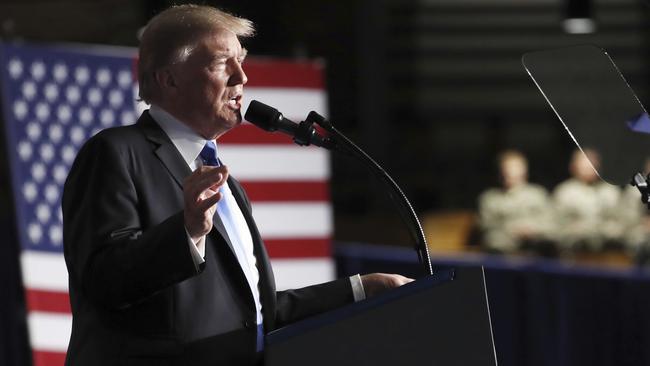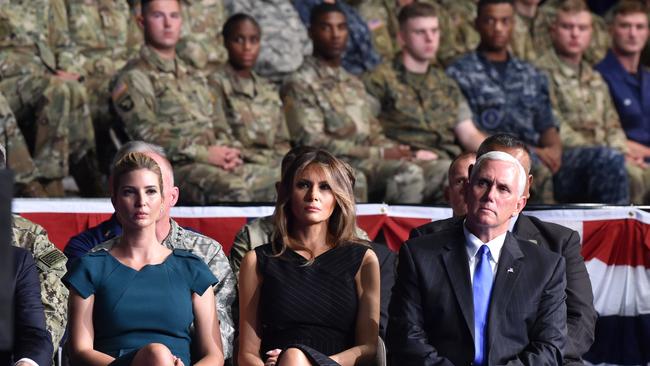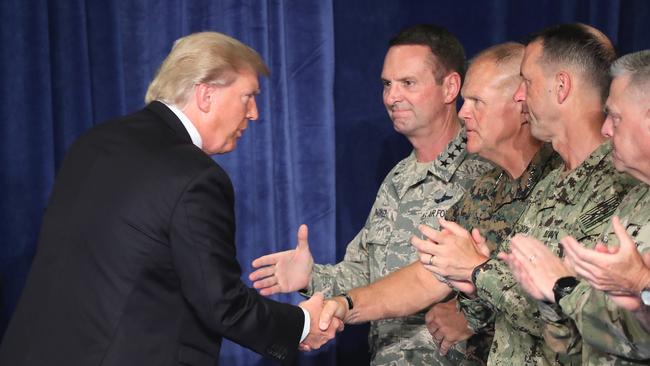Donald Trump ups the ante in Afghanistan and warns Pakistan
The Taliban have dismissed Donald Trump’s U-turn on Afghanistan that will see more American troops sent to the war-torn country.
The Taliban have warned that Afghanistan would become a “graveyard” for the United States after President Donald Trump gave the green light to send thousands more American troops to the country.
“If America doesn’t withdraw its troops from Afghanistan, soon Afghanistan will become another graveyard for this superpower in the 21st century,” Taliban spokesman Zabiullah Mujahid said in a statement.
A senior Taliban commander told AFP that Mr Trump was just perpetuating the “arrogant behaviour” of previous presidents such as George Bush. “He is just wasting American soldiers. We know how to defend our country. It will not change anything. For generations we have fought this war, we are not scared, we are fresh and we will continue this war until our last breath.”
In an address to the nation today Mr Trump said he would expand the US mission in Afghanistan but take a different approach from his predecessors by being tougher on neighbouring Pakistan, giving up the goal establishing US democratic values, and refraining from telegraphing his intentions on the use of American forces.
In the 30-minute speech peppered with tough talk, Mr Trump acknowledged that his instinct had been to pull out of Afghanistan. But, concluding he must bow to realities, he went on to outline a new strategy for South Asia predicated on the need to remain engaged in the region.
“From now on, victory will have a clear definition,” he said from the Fort Myer military base in Arlington, Virginia, describing the defeat of terrorist groups and the protection of American interests.
The strategy Mr Trump approved includes what military officials said will provide up to 4000 additional US troops for efforts to counter the Islamic State extremist group and the Taliban as well as continue training Afghan forces. There are about 8400 U.S. troops in Afghanistan now, along with about 4000 allied troops under the umbrella of the North Atlantic Treaty Organisation.
Mr Trump also alluded to divisions in the US over deadly protests earlier this month in Charlottesville, stressing the importance of national unity. “The young men and women we send to fight our wars abroad deserve to return to a country that is not at war with itself at home,” Mr Trump said.
Mr Trump didn’t spell out troop numbers in Afghanistan, but made clear American forces would remain. He said the US wouldn’t stay indefinitely and that he was not writing “a blank check.” He allowed for the possibility of an eventual peace deal with the Taliban, but said he couldn’t say whether such a deal was possible. Secretary of State Rex Tillerson, in a statement timed to coincide with Mr Trump’s speech, elaborated on prospects for talks.
“The Taliban has a path to peace and political legitimacy through a negotiated political settlement to end the war,” Mr Tillerson said. “We stand ready to support peace talks between the Afghan government and the Taliban without preconditions.”
Mr Trump also sought to distance himself from past presidents in his approach to Pakistan.
“We can no longer be silent about Pakistan’s safe havens for terrorist organisations, the Taliban and other groups that pose a threat to the region and beyond,” Mr Trump said.
Pakistan, he said, “has much to gain” from partnering with the US in its efforts in Afghanistan. “It has much to lose by continuing to harbour terrorists.”
Administration officials said Pakistan’s compliance under Mr Trump’s plan would result in the return of the hundreds of millions of dollars in assistance denied by former president Barack Obama, US officials said.
Pakistan maintains that both the extremist Haqqani network and Taliban groups now are based in Afghanistan, and that it has carried out operations over the past three years to clear out the presence of Afghan insurgents and other militants, especially with an offensive in the North Waziristan tribal area, which had served as a headquarters for Haqqani.
“Now, we have cleared all the areas that were in Pakistan. There is no organised infrastructure of any terrorist organisation in Pakistan,” said Major General Asif Ghafoor, the spokesman of Pakistan’s military said Monday, in a news conference before the Trump announcement. “We have operated against all terrorists, including Haqqani network.”

Pakistan, which has lost US assistance over what Washington sees as inaction against the Haqqani network over the past two years, says American assistance won’t determine its policy.
After meeting the head of US Central Command last week, General Joseph Votel, Pakistan’s army chief, General Qamar Bajwa, said: “More than financial or material assistance, we seek acknowledgment of our decades long contributions towards regional peace and stability.”
One key question in the US strategy review has been whether Mr Trump would remove the current war commander in Afghanistan, General John Nicholson.
Mr Trump had reportedly fumed in recent weeks that he should be fired. But General Nicholson was expected to stay on, US officials said.
The task of reaching an agreement within the White House on a strategy took months longer than anyone believed it would, to the chagrin of people such as Senator John McCain, who this month proposed a strategy of his own in an effort to cajole the administration to settle on one.
Mr Trump in June provided defence secretary, Jim Mattis, the authority to send as many as 3900 additional troops to Afghanistan. But Mr Mattis said he wanted the White House to agree to a long-term strategy before deploying more forces.

The plan remained on hold throughout the summer due to an impasse within the administration. Much of the delay in unveiling the strategy was due to the lack of consensus on how to address the role of Pakistan, several official said.
Key Trump advisers argued in the administration debate that Mr Trump had to do more in Afghanistan, not less. If Mr Trump didn’t do so, he ran the risk of being held responsible for any precipitous decline in stability or for an attack on US interests traceable to Afghanistan, several US officials maintained.
One option considered was a troop reduction; another was to buttress the existing force of about 8,400 Americans with a private mercenary army. A final option, supported by Mr Mattis, Gen. Joe Dunford, chairman of the Joint Chiefs of Staff, and H.R. McMaster, Mr Trump’s national security adviser, was to reinforce the current strategy by adding additional troops.
A major obstacle to the preference of military officials was eliminated with the departure of Steve Bannon, Mr Trump’s senior White House strategist and the most ardent anti-interventionist voice within the West Wing, people familiar with the discussions said. It wasn’t lost on advocates for a new strategy that the decision on the way forward was made the same day Mr Bannon, who fought to prevent a troop increase, exited the White House.

Not everyone believes Mr Trump is taking the right tack by announcing the strategy in a prime-time address. Even supporters of the new policy believe the administration would have been wiser to just quietly announce the new troop numbers, according to a GOP Senate foreign policy aide. “Afghanistan is in the back of Americans’ minds,” the aide said. “Why remind everyone that we’ve been there 16 years?” White-House aides said the televised address was Mr Trump’s choice for unveiling the strategy. “It’s something the president felt he wanted to do,” a senior White House official said Monday. “Lives are on the line no matter what you decision you make.” The official said that aides wanted the speech to be televised before the nation because they believe the president gets better results when he “speaks directly to the American people.” The new strategy was being unveiled amid a series of significant territorial gains in Afghanistan by the resurgent Taliban, which is taking advantage of weakened security across the country and growing public distrust of Afghan President Ashraf Ghani’s government.
On Monday, Afghan forces lost the strategic district of Khamab in northern Jawzjan province to the Taliban following days of intense fighting, local officials said. The insurgent group seized another five districts in the past month, according to Afghan officials. Afghan security forces are also stretched battling the Taliban and fighters from Afghanistan’s nascent branch of Islamic State.
In May, the Special Inspector General for Afghanistan Reconstruction, the US government organisation on Afghan reconstruction, said Afghan forces had suffered high casualties while battling the insurgencies, and that one-third of the country was in Taliban control.
With Eli Stokols, Peter Nicholas, Rebecca Ballhaus, Saeed Shah, Qasim Nauman and Ehsanullah Amiri
Wall Street Journal



